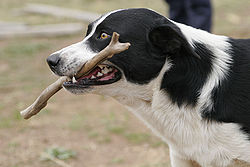Dog intelligence: Difference between revisions
imported>Nancy Sculerati MD No edit summary |
imported>Nancy Sculerati MD No edit summary |
||
| Line 1: | Line 1: | ||
[[Image:Dog_retrieving_stick.jpg|thumb|250px|Many dogs can easily be trained to retrieve.]] | [[Image:Dog_retrieving_stick.jpg|thumb|250px|Many dogs can easily be trained to retrieve.]] | ||
'''Dog intelligence''' is the ability of a [[dog]] to learn and solve problems. It's one thing to state what the concept of canine intelligence is, and it's quite another to measure it in any way. [[Dog trainer]]s, owners, and researchers have as much (or more) difficulty agreeing on how to evaluate canine intelligence as they do for human [[intelligence (trait)|intelligence]]. There are good reasons, though, for discussing the intelligence of dogs, and one of them is that it is a major factor in choosing a dog for canine work or human companionship. | '''Dog intelligence''' is the ability of a [[dog]] to learn and solve problems. It's one thing to state what the concept of canine intelligence is, and it's quite another to measure it in any way. [[Dog trainer]]s, owners, and researchers have as much (or more) difficulty agreeing on how to evaluate canine intelligence as they do for human [[intelligence (trait)|intelligence]]. There are good reasons, though, for discussing the intelligence of dogs, and one of them is that it is a major factor in choosing a dog for canine work or human companionship. | ||
So, when discussing the intelligence of dogs it's best to make clear that this article treats the topic as viewed from a human perspective. | |||
Certain [[dog breed|breeds]], such as [[Border Collie]]s and [[Golden Retriever]]s, are generally easier to [[obedience training|train]] than others, such as some [[hound]]s and [[sled dog]]s. The ability to learn and obey commands, however, is not the only possible measurement of intelligence. | Certain [[dog breed|breeds]], such as [[Border Collie]]s and [[Golden Retriever]]s, are generally easier to [[obedience training|train]] than others, such as some [[hound]]s and [[sled dog]]s. The ability to learn and obey commands, however, is not the only possible measurement of intelligence. | ||
Revision as of 19:58, 24 January 2007
Dog intelligence is the ability of a dog to learn and solve problems. It's one thing to state what the concept of canine intelligence is, and it's quite another to measure it in any way. Dog trainers, owners, and researchers have as much (or more) difficulty agreeing on how to evaluate canine intelligence as they do for human intelligence. There are good reasons, though, for discussing the intelligence of dogs, and one of them is that it is a major factor in choosing a dog for canine work or human companionship.
So, when discussing the intelligence of dogs it's best to make clear that this article treats the topic as viewed from a human perspective.
Certain breeds, such as Border Collies and Golden Retrievers, are generally easier to train than others, such as some hounds and sled dogs. The ability to learn and obey commands, however, is not the only possible measurement of intelligence.
Livestock guardian breeds such as the Great Pyrenees, Kuvasz, and Anatolian Shepherd Dog are notorious for hesitating rather than instantly obeying commands. Hounds may also suffer from this type of ranking; several rank in the bottom tier of "The Intelligence of Dogs" list (such as Beagles, Bloodhounds, and Basset Hounds). These dogs are bred to have more of a "pack" mentality with other dogs and less reliance on a master's direct commands. While they may not have the same kind of intelligence as a Border Collie, they were not bred to learn and obey commands quickly, but to think for themselves while trailing game.
Testing and research
Some tests for intelligence involve the dog's ability to recognize and respond to a large vocabulary; other tests involve their desire or ability to respond to different situations. If one puts a towel over a dog's head, is the intelligent dog the one who pulls it off or is the intelligent dog the one who sits and waits, as if figuring that humans do strange things from time to time and if they put the towel on the dog's head there must be a reason for it? Just as with humans, there is a wide variety of interpretations as to what makes a dog "intelligent".
Various studies have attempted to confirm the intelligence of dogs in a rigorous manner. A recent example is animal psychologist Juliane Kaminski's paper in Science that demonstrated that Rico, a Border Collie, could learn over 200 words. Rico could remember items' names for four weeks after last exposure (Kaminski eliminated the Clever Hans effect using strict protocols).
Rico was also able to interpret phrases such as "fetch the sock" in terms of its component words (rather than considering the utterance to be a single word): he could give the sock to a specified person.
Psychologist Kathy Coon ranked dog breeds by intelligence in her book The Dog Intelligence Test based on a standardized intelligence test for dogs.
Stanley Coren ranked dog breeds by intelligence in his book The Intelligence of Dogs based on surveys of dog trainers, the article for which contains a summary of the rankings obtained.
See also
- The Intelligence of Dogs (Book by Stanley Coren)
- Dog training
- Intelligence (trait)
References
- Cunliffe, Juliette (2004). The Encyclopedia of Dog Breeds. Parragon Publishing. ISBN 0-75258-276-3.
- Fogle, Bruce (2000). The New Encyclopedia of the Dog. Doring Kindersley (DK). ISBN 0-7894-6130-7.
